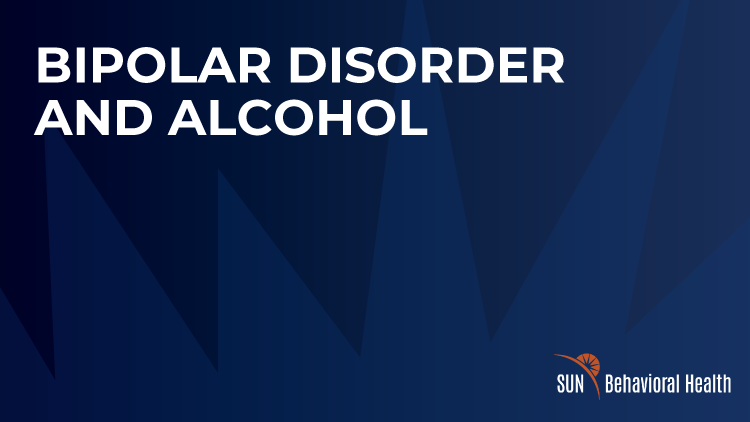Services
- Home
- Mental Health Services
- Who We Treat
- How We Treat
- Patients & Visitors
- About
close

In 2019, 12.1 adults in Texas experienced frequent mental distress. Around 6 percent of Texans report heavy drinking. Overlap between these two populations is an example of a co-occurring disorder. A co-occurring disorder is when a person has two or more substance use or mental health disorders. Around 9.2 million people in the United States have a co-occurring disorder.
A common co-occurring disorder is the presence of alcohol use disorder and bipolar disorder. Alcohol use disorder, commonly called alcoholism, is characterized by an inability to end or reduce alcohol use regardless of the consequences of that use. Bipolar disorder is a mental health condition characterized by shifts in mood and energy levels.
The good news is treatment for bipolar can give you or your loved one quality care needed to manage the condition and thrive, even if bipolar co-occurs alongside other conditions such as alcohol use disorder.
There is no definitive cause of alcohol use disorder, but several risk factors exist. The presence of one or more risk factors does not mean a person will develop an alcohol use disorder, but it increases the chances a person will struggle with alcohol use. A few of these risk factors are:
Researchers do not know the definitive cause of bipolar disorder, but some factors contribute to the development of bipolar disorder. Significant evidence points to a genetic component, but a person’s genetics, no matter how problematic, does not guarantee that the development of bipolar disorder will occur. Additionally, having a family history of bipolar disorder does not mean a person will always develop bipolar disorder. Many factors impact bipolar disorder, including:
Alcohol Use Disorder and Bipolar Disorder share some of the same risk factors. Researchers do not know for certain if one causes the other, but multiple scenarios are likely and depend on a person’s situation.
A common opinion is some people with undiagnosed bipolar disorder increase their drinking to self-medicate. Often, alcohol use helps in the short term with mental health conditions like bipolar disorder, but over time alcohol use alters the way a person’s brain releases neurotransmitters and contributes to the development of mental health disorders. Therefore a person who already has bipolar can worsen their condition with alcohol use.
It is also possible for a person drinking a lot to develop mental health conditions such as bipolar disorder. This is a result of alcohol’s effect on the brain’s neurotransmitters.
Because the two conditions share many risk factors, it is also possible that they develop over time alongside one another due to the exact root causes. For example, a person who is already under stress and then experiences a traumatic event may see a sharp decline in their mental health and an increase in their alcohol intake. Without proper treatment, this person could develop bipolar disorder.
There is no clear path for the development of co-occurring alcohol use disorder and bipolar disorder. It depends on a person’s unique situation. However, there are evidence-based treatments designed to help people find recovery and wellness when they experience a co-occurring disorder.
48.5 percent of people with bipolar disorder struggle with alcohol use disorder. Treatment for co-occurring disorders must address all conditions. This is because these conditions significantly impact one another.
At SUN Houston, our behavioral health practitioners know that individualized quality treatment for co-occurring disorders is essential in addressing a person’s unique situation. Some of the common treatments implemented to treat an individual suffering from bipolar and alcohol use disorder are:
The staff at SUN also utilizes many therapeutic approaches. For example, group psychotherapy helps those in recovery to understand they are not alone in their struggles. In a group setting, people can learn from each other as they pursue healing and wellness as a community.
Cognitive Behavioral Therapy (CBT) identifies unhelpful thoughts, beliefs, and behavioral patterns. A therapist will help their patient overcome these unhelpful ways of thinking while creating thoughts, beliefs, and practices that lead to wellness.
Our staff utilizes Recreational Therapy to give those seeking recovery creative ways to process their feelings and find relief from bipolar, alcohol use disorder, and other conditions.
In many cases, pet therapy benefits those in recovery. Time with an animal reduces depression and anxiety and leads to increased wellness.
Contact SUN Houston today if you or a loved one are suffering from the effects of bipolar and alcohol use disorder or another co-occurring disorder. Our team is prepared to offer treatments and education to help you recover. You do not have to struggle alone. Recovery is possible. Contact us today at 713-796-2273 to learn more about our individualized treatment options.
Do People With Bipolar Disorder Drink a Lot of Alcohol?
48.5 percent of people with bipolar disorder struggle with alcohol use disorder. It is common for these two conditions to co-occur. However, it is unfair to assume everyone with bipolar disorder also has an alcohol use disorder. When it comes to substance use and mental health, each person has an individual set of conditions that caused their condition and will need to be treated with an individualized approach to find healing and recovery.
Should Someone With Bipolar Disorder Drink Alcohol?
Alcohol use disorder develops because of many different risk factors. Among those risk factors are bipolar disorder and other mental health conditions. If someone knows they have bipolar disorder, they should take extra care with their alcohol use. This does not necessarily mean they can never drink alcohol, only that they should be aware they are at higher risk for developing alcohol use disorder and should consider that when making decisions about alcohol use.